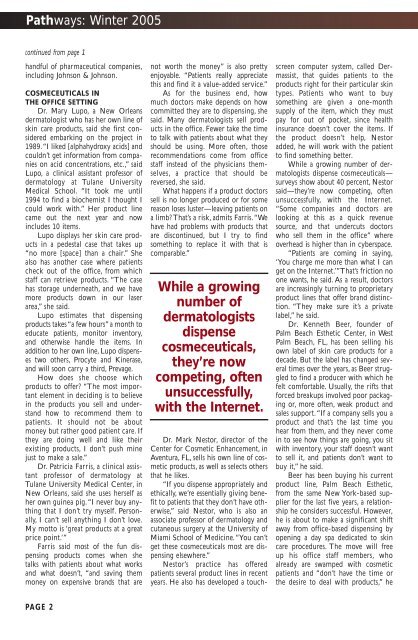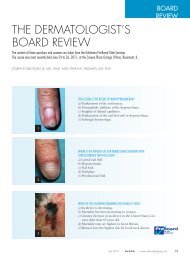Download PDF - The Dermatologist
Download PDF - The Dermatologist
Download PDF - The Dermatologist
Create successful ePaper yourself
Turn your PDF publications into a flip-book with our unique Google optimized e-Paper software.
Pathways: Winter 2005<br />
continued from page 1<br />
handful of pharmaceutical companies,<br />
including Johnson & Johnson.<br />
COSMECEUTICALS IN<br />
THE OFFICE SETTING<br />
Dr. Mary Lupo, a New Orleans<br />
dermatologist who has her own line of<br />
skin care products, said she first considered<br />
embarking on the project in<br />
1989.“I liked [alphahydroxy acids] and<br />
couldn’t get information from companies<br />
on acid concentrations, etc.,” said<br />
Lupo, a clinical assistant professor of<br />
dermatology at Tulane University<br />
Medical School. “It took me until<br />
1994 to find a biochemist I thought I<br />
could work with.” Her product line<br />
came out the next year and now<br />
includes 10 items.<br />
Lupo displays her skin care products<br />
in a pedestal case that takes up<br />
“no more [space] than a chair.” She<br />
also has another case where patients<br />
check out of the office, from which<br />
staff can retrieve products. “<strong>The</strong> case<br />
has storage underneath, and we have<br />
more products down in our laser<br />
area,” she said.<br />
Lupo estimates that dispensing<br />
products takes “a few hours” a month to<br />
educate patients, monitor inventory,<br />
and otherwise handle the items. In<br />
addition to her own line, Lupo dispenses<br />
two others, Procyte and Kinerase,<br />
and will soon carry a third, Prevage.<br />
How does she choose which<br />
products to offer? “<strong>The</strong> most important<br />
element in deciding is to believe<br />
in the products you sell and understand<br />
how to recommend them to<br />
patients. It should not be about<br />
money but rather good patient care. If<br />
they are doing well and like their<br />
existing products, I don’t push mine<br />
just to make a sale.”<br />
Dr. Patricia Farris, a clinical assistant<br />
professor of dermatology at<br />
Tulane University Medical Center, in<br />
New Orleans, said she uses herself as<br />
her own guinea pig.“I never buy anything<br />
that I don’t try myself. Personally,<br />
I can’t sell anything I don’t love.<br />
My motto is ‘great products at a great<br />
price point.’”<br />
Farris said most of the fun dispensing<br />
products comes when she<br />
talks with patients about what works<br />
and what doesn’t, “and saving them<br />
money on expensive brands that are<br />
not worth the money” is also pretty<br />
enjoyable. “Patients really appreciate<br />
this and find it a value-added service.”<br />
As for the business end, how<br />
much doctors make depends on how<br />
committed they are to dispensing, she<br />
said. Many dermatologists sell products<br />
in the office. Fewer take the time<br />
to talk with patients about what they<br />
should be using. More often, those<br />
recommendations come from office<br />
staff instead of the physicians themselves,<br />
a practice that should be<br />
reversed, she said.<br />
What happens if a product doctors<br />
sell is no longer produced or for some<br />
reason loses luster—leaving patients on<br />
a limb? That’s a risk, admits Farris.“We<br />
have had problems with products that<br />
are discontinued, but I try to find<br />
something to replace it with that is<br />
comparable.”<br />
While a growing<br />
number of<br />
dermatologists<br />
dispense<br />
cosmeceuticals,<br />
they’re now<br />
competing, often<br />
unsuccessfully,<br />
with the Internet.<br />
Dr. Mark Nestor, director of the<br />
Center for Cosmetic Enhancement, in<br />
Aventura, FL, sells his own line of cosmetic<br />
products, as well as selects others<br />
that he likes.<br />
“If you dispense appropriately and<br />
ethically, we’re essentially giving benefit<br />
to patients that they don’t have otherwise,”<br />
said Nestor, who is also an<br />
associate professor of dermatology and<br />
cutaneous surgery at the University of<br />
Miami School of Medicine.“You can’t<br />
get these cosmeceuticals most are dispensing<br />
elsewhere.”<br />
Nestor’s practice has offered<br />
patients several product lines in recent<br />
years. He also has developed a touchscreen<br />
computer system, called Dermassist,<br />
that guides patients to the<br />
products right for their particular skin<br />
types. Patients who want to buy<br />
something are given a one-month<br />
supply of the item, which they must<br />
pay for out of pocket, since health<br />
insurance doesn’t cover the items. If<br />
the product doesn’t help, Nestor<br />
added, he will work with the patient<br />
to find something better.<br />
While a growing number of dermatologists<br />
dispense cosmeceuticals—<br />
surveys show about 40 percent, Nestor<br />
said—they’re now competing, often<br />
unsuccessfully, with the Internet.<br />
“Some companies and doctors are<br />
looking at this as a quick revenue<br />
source, and that undercuts doctors<br />
who sell them in the office” where<br />
overhead is higher than in cyberspace.<br />
“Patients are coming in saying,<br />
‘You charge me more than what I can<br />
get on the Internet.’”That’s friction no<br />
one wants, he said. As a result, doctors<br />
are increasingly turning to proprietary<br />
product lines that offer brand distinction.<br />
“<strong>The</strong>y make sure it’s a private<br />
label,” he said.<br />
Dr. Kenneth Beer, founder of<br />
Palm Beach Esthetic Center, in West<br />
Palm Beach, FL, has been selling his<br />
own label of skin care products for a<br />
decade. But the label has changed several<br />
times over the years, as Beer struggled<br />
to find a producer with which he<br />
felt comfortable. Usually, the rifts that<br />
forced breakups involved poor packaging<br />
or, more often, weak product and<br />
sales support.“If a company sells you a<br />
product and that’s the last time you<br />
hear from them, and they never come<br />
in to see how things are going, you sit<br />
with inventory, your staff doesn’t want<br />
to sell it, and patients don’t want to<br />
buy it,” he said.<br />
Beer has been buying his current<br />
product line, Palm Beach Esthetic,<br />
from the same New York-based supplier<br />
for the last five years, a relationship<br />
he considers successful. However,<br />
he is about to make a significant shift<br />
away from office-based dispensing by<br />
opening a day spa dedicated to skin<br />
care procedures. <strong>The</strong> move will free<br />
up his office staff members, who<br />
already are swamped with cosmetic<br />
patients and “don’t have the time or<br />
the desire to deal with products,” he<br />
PAGE 2
















